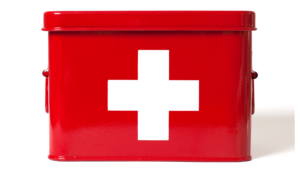Ways to Practice Emotional First Aid
Whenever we sustain physical wounds, we are taught to treat them quickly and to patch them up – the same thing goes for emotional wounds. Emotional wounds such as rejection, failure, guilt, or loss are just as common as physical wounds, or even more so. Just like how we would treat physical wounds, we should address our emotional wounds as well. Physical wounds can easily be treated with gauze and disinfectant, but how about our emotional wounds?
What is Emotional First Aid?
Emotional first aid is an often underrated idea: its concept is to take care of emotional injuries, traumas, or wounds, in the same way, we treat physical wounds. Emotional first aid is important so that these emotional injuries do not become more damaging in the long run and scar over. But how do we exactly apply and practice emotional first aid? Unlike physical wounds, emotional wounds do not heal on their own and must be properly addressed to solve the problem.

5 Ways to Practice Emotional First Aid
It is important to practice emotional first aid to increase emotional strength and resilience. Here, we have gathered some ways for you to practice emotional first aid enabling you to heal and improve.
1. Acknowledge the pain
When we get wounded, we feel the physical pain and our body responds in a unique way. The first step in emotional first aid is to acknowledge that the pain is there. Self-denial will hamper your efforts to practice emotional first aid and will only delay the healing process. Be aware of your emotional pain, assess how to act in response to that pain, and begin steps to healing.
2. Redirect when necessary
Failure or loss often makes us lose the drive to keep going. It often allows us to focus on the negative things instead of the positive ones. When dealing with emotional pain, take time to step back, gather your thoughts, and reframe the situation. Assess which steps you can control, what you can improve, and how you will do better next time.
Practice the ability to adapt instead of sulking and regretting what you did wrong. When you practice emotional first aid, you reduce feelings of helplessness and regret.
3. Find a distraction
Emotional pain can often take a toll on one’s mental health. Negative experiences can keep replaying in our heads and worsen our mental health. What can help is finding a good distraction – be it a hobby, an exercise regimen, or anything healthy that you can distract yourself with. Brooding over negative things can lead to a deeper psychological problem.
4. Boost Your Self-Esteem
When you feel like putting yourself down, take a second, and be emphatic to yourself. Fight rejection with self-esteem. Self-esteem is an emotional immune system that buffers us from emotional pain and strengthens our emotional resilience.
You are the best person to heal yourself. Practice self-compassion and build your self-esteem, to recover from the emotional damage you sustained. Instead of criticizing yourself, support, and be compassionate.
5. Learn what treatments work for your emotional wounds
Pay attention to yourself and your mental health. No one knows your pain and emotional trauma as much as you do. Learn what treatments work for your emotional wounds and what don’t.
Addressing your emotional pain is not a one-shot throw, you have to try out various techniques and habits to figure out which ones are effective in providing you with emotional first aid.

Practicing these habits of emotional first aid can change your perspective and quality of life quickly. If emotional pain persists, seeking professional help is the next best step.
Fortunately, there are several mental health services near you. Head on over to Mindshift Psychological Services and discover the different treatment strategies we have to offer, tailored to your needs and preferences. Engage in teletherapy, group counseling sessions, or even one-on-one consultation. Leave your mental health in the hands of trusted providers who can help you heal. Visit any of the branches near me in California near Los Angeles, Newport Beach, and Corona. See also branches located in Southern California – Century City, Costa Mesa, and Brentwood. Take full control of your life and learn to practice emotional first aid.



